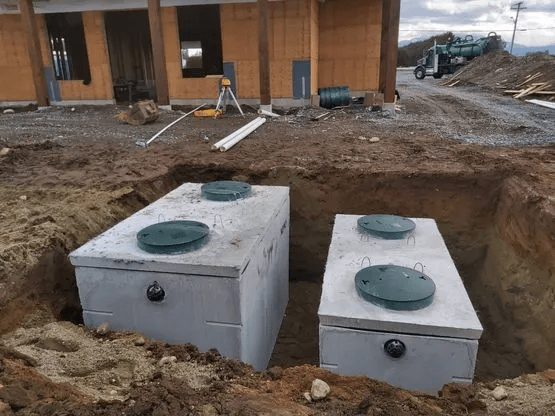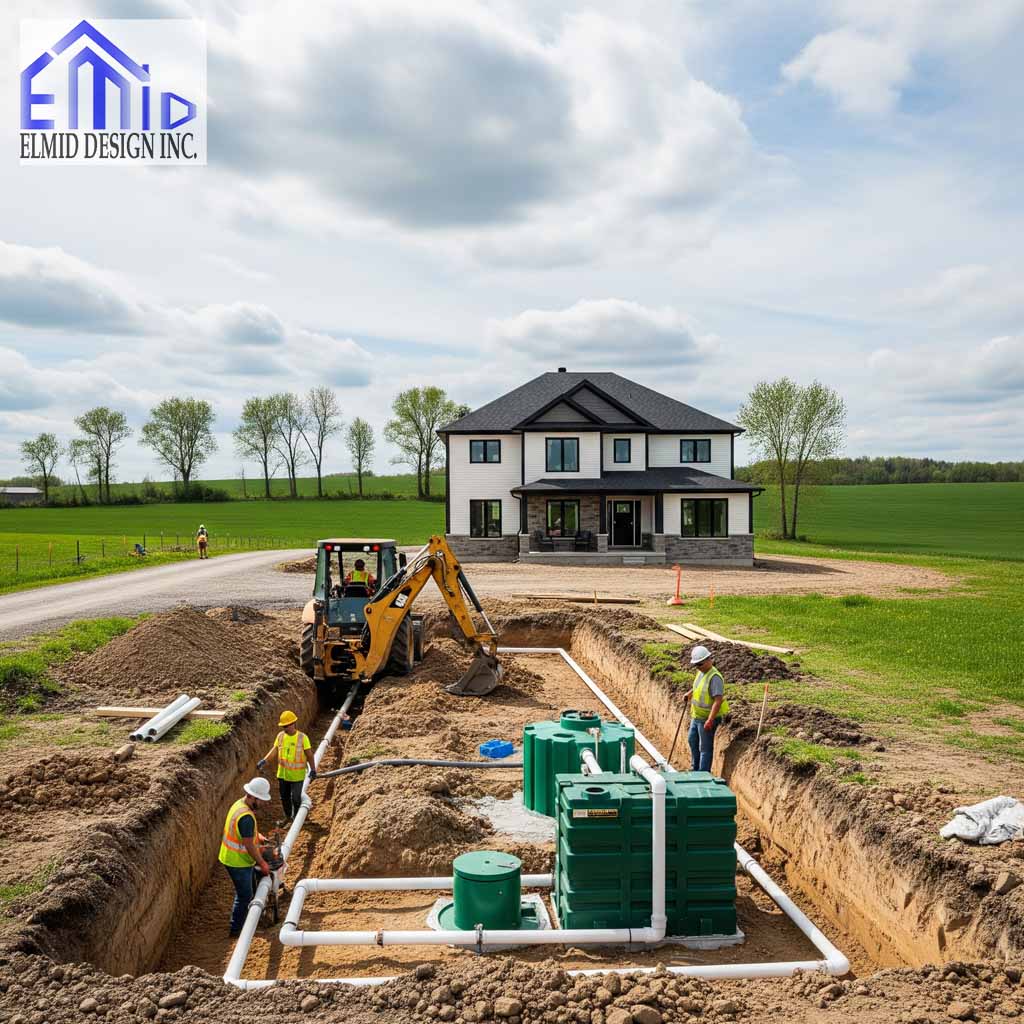Designing a septic system in Bolton integrates environmental safety, local building codes, and expert guidance to ensure long‑term reliability and regulatory compliance.
Why Septic Design Matters in Bolton?
Septic design matters in Bolton because it protects local water quality and ensures safe wastewater management. Qualified professionals must follow Ontario Building Code standards and local guidelines to avoid failures. Choosing the right design now saves homeowners from costly repairs later and maintains trust in your authority as a knowledgeable provider.
Understanding Ontario’s Building Code Requirements
Ontario’s Building Code Part 8 sets the standards for septic systems, including site evaluation, soil testing, and layout design. These regulations help safeguard groundwater and public health. Qualified designers—professional engineers or registered septic system designers with a BCIN—must prepare design documents. They also complete applications for building permits in Caledon, covering Bolton.
Who Can Design Septic Systems in Bolton?
In Bolton, septic designs must come from qualified professionals. Professional engineers and architects may design without a BCIN. Registered designers need a BCIN and must pass specific exams. Licensed installers can only design systems that they themselves install. This ensures accountability and regulatory compliance.
The Role of Permits and Local Authority
When it comes to permits, installing or modifying a septic system requires a building permit from Caledon. The permit reviews must include site plans, soil evaluation, and compliance with zoning and environmental law. Early involvement from qualified designers ensures swift permit approval and cost predictability.
Site Evaluation and Soil Testing
Site evaluation starts with a detailed property survey and soil testing. Soil percolation, depth to bedrock, and groundwater levels determine which type of system works. Without this early step, you risk ineffective systems, leaks or environmental problems. Qualified professionals interpret results and adapt design accordingly.
Choosing the Right Septic System Type
Ontario recognizes several classes of systems. Class 4 systems suit most rural homes. Within Class 4, Level I (anaerobic) and Level IV (aerobic) options differ. Aerobic systems treat effluent more thoroughly, making them better for poor soils or sensitive environments. Designers recommend the system that balances site constraints and long‑term performance.
Ensuring Environmental Protection
Effective septic design safeguards Bolton’s rivers and groundwater. Advanced treatment systems, when suitable, reduce nutrient and pathogen loads. Designers must respect conservation areas and wetlands. Choosing certified systems and following regulations helps preserve local ecology.
The Value of Professional Credentials
Hiring a firm like Elmid Design Inc builds credibility in Bolton. Their PEO certification demonstrates Ontario-level professional engineering expertise. That kind of authority reassures homeowners, streamlines approvals, and supports Google’s E‑A‑T standards in content and service.
Working with Local Conditions in Bolton
Bolton lies within Caledon and falls under Peel region’s environmental landscape. Local soils, lot layouts, and conservation rules shape septic design. Working experience in Bolton and understanding local expectations ensures designs fit both technical and regulatory needs.
Design Submission and Permit Process
Designers submit plans to Caledon’s building department. Drawings must include property lines, setbacks, soil test locations, system layout and designer credentials. After submission, regular communication and responsiveness help avoid back‑and‑forth delays. Permit approval clears the way for construction.
Installation Oversight and Quality Assurance
Once permitted, installation must follow the approved design precisely. Qualified installers handle trenching, tank placement, piping, and backfill. Designers and engineers should verify compliance during and after installation through site visits and system testing.
Maintenance and Longevity of Your Septic System
Proper design also considers ease of maintenance. Access risers, inspection ports, and clear documentation make future pumping, inspections or repairs simple. A well-designed system stays functional for decades, protecting homeowners and Bolton’s environment.

Understanding Ontario Building Code Tank Standards
The Ontario Building Code mandates that septic tanks must have a minimum working capacity of 3600 L or double the daily sewage flow for residential use or triple for non‑residential use. Additionally septic tanks require at least two compartments each sized to specific volumes and connected to maintain proper flow and treatment quality. The first compartment must hold at least 1.3 times daily flow or 2400 L minimum and subsequent compartments must hold at least half the volume of the first. Partitions must rise above the liquid outlet and include well‑sized openings to enable proper flow and gas exchange. Tanks must allow for a minimum depth and accessible risers if buried deeper than 300 mm for maintenance purposes. This ensures durability and effective treatment.
Separation Distances and Environmental Protection
Ontario mandates minimum separation distances for septic systems to safeguard water sources and public health. Systems must remain at least 15 meters from drilled wells and water bodies and 30 meters from dug wells which are less secure. Property line setbacks are typically five meters and may increase depending on soil, slope, or system complexity. These distances prevent contamination, especially of groundwater and nearby ecosystems, and exemplify regulatory attention to environmental stewardship during septic system planning.
Permit Requirements in Caledon and Bolton
Installing or modifying a septic system in Bolton requires a building permit issued by the Town of Caledon. This means submitting detailed drawings and forms that meet Ontario Building Code standards, zoning bylaws, and other applicable laws. Required documents include plot plans with property lines, system layout, designer credentials including BCIN and signature, and PDF submissions following precise guidelines. Permit reviews may take ten business days for residential projects, and revisions can cause delays. Securing a permit early avoids delays and ensures legal compliance.
Why Local Expertise Makes a Difference
Local knowledge matters when designing a septic system in Bolton. Designers familiar with Caledon’s soil types, lot configurations, and zoning rules navigate regulatory steps efficiently. A firm like Elmid Design Inc brings credibility and ensures quality by applying municipal guidelines and integrating their PEO-certified engineering expertise. Their awareness of local conditions accelerates approvals and delivers solutions aligned with Bolton’s unique environment.
Protecting Ground and Surface Water
Septic systems, without proper design, can leak nutrients and pathogens that harm water quality. Phosphates and nitrates may trigger algal blooms, while pathogens like E. coli risk public health. Proper site evaluation, system type, and layout minimize these threats. In sensitive or sandy soils near water, advanced treatment or hybrid systems may become necessary. Using regulations and soil data ensures long‑term environmental protection.
Maintenance Considerations for Long-Term Success
Effective septic design must include maintenance access for pumping, inspection, and repairs. Design features such as risers, inspection ports, and clearly labeled layouts promote ease of use and longevity. Without these features, systems fail prematurely or incur costly disruptions. Prioritizing maintenance during design saves time and safeguards performance over decades.
Summary of Design and Regulatory Essentials
Part 2 underscores the importance of detailed Ontario Building Code requirements for tank sizing, compartments, and access, as well as mandated separation distances. It highlights building permit obligations in Caledon, the value of local expertise through practices of Elmid Design Inc, and the critical role of design in preventing environmental harm. It also emphasizes designing with maintenance in mind. Together, these factors ensure septic systems in Bolton are safe, compliant, durable, and eco‑friendly.
Advanced Septic Treatment Options for Bolton
In Bolton properties with challenging conditions such as tight lot sizes shallow soils or nearby sensitive features choosing advanced septic systems offers crucial flexibility and improved treatment. Advanced treatment units treat most wastewater before distributing it to the soil thus improving effluent quality and often reducing required leaching area. Options include aerobic treatment units that promote oxygen‑dependent microbial breakdown and media filter systems that remove contaminants before soil absorption. These systems suit environments where conventional designs fail and comply with Ontario’s standards for sensitive or compact sites.
Benefits and Constraints of Advanced Systems
Advanced septic systems deliver cleaner effluent significantly reducing pathogens and nutrient load before discharge. Their pre‑treatment capacity allows for smaller or alternative dispersal designs such as shallow trenches or beds. However these systems typically involve mechanical components, higher installation and operation costs, and a requirement for regular maintenance and power supply in aerobic models. Homeowners must weigh upfront investment and maintenance needs against environmental protection and long‑term performance.
Maintenance Practices That Preserve System Health
Maintenance plays a vital role in ensuring septic systems in Bolton stay reliable. Regular professional inspections and pumping every three to five years prevents sludge buildup while keeping the treatment function intact. Attention to water usage and avoiding harsh chemicals safeguards bacteria essential for digestion. Keeping the drain field undisturbed and diverting surface water helps prevent soil saturation and system overload. Accurate maintenance records support the longevity and resale value of your property.
Tailoring Solutions for Bolton Homeowners
Effective design combines technical precision with local insight. Soil testing and site evaluation guide system type selection whether conventional or advanced. Firms like Elmid Design Inc blend local regulatory familiarity with professional certification to craft systems that meet Ontario Building Code and Town of Caledon standards while optimizing performance and environmental safety. Their involvement supports both E‑A‑T credibility and real‑world outcomes.
Real-World Septic Design Challenges in Bolton
Septic designs in Bolton often face real-world obstacles that require site-specific creativity and expert judgment. Sloped lots, compact soil types, or irregularly shaped properties challenge standard solutions and may lead to costly revisions if not properly addressed during the initial planning phase. Properties near environmentally sensitive areas or conservation lands must navigate stricter design conditions including advanced systems or larger dispersal zones. Seasonally high water tables also limit trench depth and layout options making thorough site evaluation essential. Firms like Elmid Design Inc apply deep familiarity with Bolton’s landscape to overcome these hurdles and propose workable solutions that satisfy both regulatory standards and homeowner goals.
Common Mistakes in Septic Design Projects
Many septic system failures in Bolton originate from poor planning or lack of qualified oversight during early design stages. Overlooking site constraints like groundwater level, incorrect soil classifications, or ignoring future household water loads can cause undersized or ineffective systems. Designs based on assumptions rather than test data may lead to permit rejections or costly retrofits later. Using unlicensed or non-PEO certified designers risks regulatory non-compliance and legal issues. To avoid these pitfalls it is essential to work with licensed experts familiar with Ontario’s Building Code and Caledon’s municipal regulations who ensure every system starts with accurate testing and full documentation.
Cost Considerations and Budget Planning
Understanding the full scope of septic system costs in Bolton ensures homeowners make informed decisions from the beginning. Total expenses include design fees, permit application charges, system components, excavation work, soil testing, and any advanced treatment unit installation. Costs can rise with challenging soil types, irregular lot shapes, or strict environmental regulations requiring system customization. Ignoring these variables during planning causes budget surprises or project delays. By consulting early with firms like Elmid Design Inc, which handles both technical requirements and regulatory filings, homeowners receive complete cost projections tailored to their property, minimizing the chance of unexpected fees or revisions.
Technological Trends Shaping Septic Systems
Modern technology has changed how septic systems are designed, monitored, and maintained in communities like Bolton. Advanced monitoring systems with sensors and alerts help identify performance issues before failure occurs, giving homeowners peace of mind and protecting their property. Sustainable materials and energy-efficient treatment units are becoming more popular as homeowners seek eco-conscious options aligned with conservation values. Designers are integrating digital modeling tools and automated layout generation to improve design speed and precision. These innovations help homeowners achieve better long-term value, especially when paired with professional firms that understand how to implement new systems while meeting Ontario’s strict regulatory framework.
Design Timelines and What Homeowners Should Expect
The design process for a septic system in Bolton does not happen overnight and knowing what to expect helps homeowners plan effectively. It begins with a site evaluation that includes soil testing and property surveying which typically takes a few days depending on conditions. Once results are in the designer begins preparing layouts and technical drawings for permit submission. Reviewing documents and securing municipal approval through Caledon can take ten business days or longer if revisions are needed. Any delay in testing or document submission pushes back installation. Working with experienced professionals like Elmid Design Inc keeps timelines realistic by ensuring all technical and regulatory steps are handled correctly from the beginning. Early communication with local authorities and consistent follow-through help avoid unnecessary hold-ups.
Inspections and Compliance Checks in Bolton
After approval, the construction phase must include key inspections to ensure compliance with the Ontario Building Code and local requirements. These inspections typically occur at trench excavation, system component placement, and final grading. Municipal inspectors review whether construction matches approved design drawings and that all setback distances and depth measurements meet code. Failing to notify the municipality at key phases risks having to uncover or redo work which causes delays and additional expense. Design professionals such as Elmid Design Inc help manage the inspection process by coordinating with contractors and local officials and by verifying field work aligns with permitted plans. These inspections serve not only as a legal checkpoint but also as a safeguard for the homeowner’s investment and long-term system reliability.
Responsibilities After System Installation
Once a septic system is installed and approved the homeowner must take on new responsibilities to ensure it performs effectively for years. This includes following usage guidelines, scheduling maintenance, and protecting the system’s physical space from interference or overload. Homeowners should avoid building over components, parking on drain fields, or planting trees too close to the leaching bed. Following these recommendations keeps soil absorption functional and prevents clogs or failure. Having maintenance instructions and system layout from a certified design firm like Elmid Design Inc ensures the homeowner understands how to care for the system. Ongoing awareness and maintenance protect not only the household but the surrounding water systems and neighbors as well.
What Buyers Need to Know About Existing Systems
Real estate buyers in Bolton need to understand the condition and legality of any existing septic system before completing a property purchase. A septic inspection by a qualified professional identifies whether the system functions properly and if it meets Ontario Building Code standards. Buyers should ask for design drawings, permit records, and maintenance logs to confirm legal installation. Unpermitted systems or failing components can become expensive liabilities after the sale. Involving a licensed designer or engineer for an assessment prior to closing ensures the system is compliant and ready for continued use. Firms like Elmid Design Inc often offer consultation for buyers seeking clarity during the due diligence process which strengthens negotiation and helps prevent unexpected repair costs after purchase.
FAQs
What advanced septic systems work best in Bolton properties with limited space?
Advanced treatment units such as aerobic treatment units and media filters treat most wastewater before dispersal enabling smaller or alternative soil systems while meeting Ontario’s requirements.
Are advanced septic systems more expensive than conventional ones?
They generally cost more to install and operate due to mechanical parts and energy use but they offer improved effluent quality environmental protection and flexibility for tight or sensitive sites.
How often should a septic system in Bolton be inspected and pumped?
Professional inspection and pumping every three to five years help prevent failure sludge buildup and maintain treatment performance; systems with mechanical components may require annual checks.
What maintenance habits harm septic system performance?
High water usage harsh chemicals and flushing non‑biodegradable items harm the microbial process. Parking on the drain field or diverting surface water into that area can damage soil absorption.
Why hire a local PEO‑certified design firm for Bolton septic systems?
Local expertise ensures designs meet Caledon’s regulations Ontario Building Code and Bolton’s environmental conditions. Elmid Design Inc’s PEO certification enhances credibility trust and efficient approvals.

Why Elmid Design Inc is Trusted for Septic Design in Bolton
Elmid Design Inc is a PEO-certified engineering firm specializing in septic system design across Bolton and the surrounding Caledon region. With deep knowledge of Ontario Building Code and local permit requirements, their team ensures every system is designed for performance, durability, and full compliance. Elmid Design Inc combines technical precision with a strong commitment to environmental safety, earning trust from homeowners, contractors, and regulators alike. Their expertise supports efficient approvals, reliable installations, and peace of mind, making them a top choice for septic design solutions in Bolton.
Geographic Locations That We Service:
Our Licensed Professional Engineers specializing in Engineered Site Grading Plans offer the best-engineered site grading plan, lot grading and erosion plan, and drainage plan to obtain site plan approval and building permits in Ontario, including a wide range of municipalities. Each area boasts unique features and requirements, making our tailored approach essential for success.
Toronto and Surrounding Areas
In the vibrant heart of Ontario, we service Toronto (City of Toronto) and surrounding areas. Additionally, we cover Oshawa (City of Oshawa), Pickering (City of Pickering), and Clarington (Municipality of Clarington). Furthermore, our expertise extends to Ajax (Town of Ajax), Whitby (Town of Whitby), Brock (Township of Brock), Scugog (Township of Scugog), and Uxbridge (Township of Uxbridge).
Halton Region
Moving to the Halton Region, our services encompass Burlington (City of Burlington) and Halton Hills (Town of Halton Hills). Also included are Milton (Town of Milton) and Oakville (Town of Oakville).
Peel Region
In the Peel Region, we provide services in Brampton (City of Brampton), Mississauga (City of Mississauga), and Caledon (Town of Caledon).
York Region
Our services in the York Region cover Vaughan (City of Vaughan), Aurora (Town of Aurora), and East Gwillimbury (Town of East Gwillimbury). We also cater to Georgina (Town of Georgina), Markham (City of Markham), Newmarket (Town of Newmarket), Richmond Hill (City of Richmond Hill), Whitchurch-Stouffville (Town of Whitchurch-Stouffville), King (Township of King), and Bradford-West Gwillimbury (Town of Bradford-West Gwillimbury). Each municipality here offers a distinct setting, requiring our specialized approach.
Other Southern Ontario Cities and Towns
We also serve many other cities and towns in Southern Ontario. These include Hamilton (City of Hamilton), St. Catharines (City of St. Catharines), Niagara on the Lake (Town of Niagara on the Lake), Brant (County of Brant), Cambridge (City of Cambridge), Kitchener (City of Kitchener), Waterloo (City of Waterloo), and Woodstock (City of Woodstock). Furthermore, we operate in Guelph (City of Guelph), Centre Wellington (Township of Centre Wellington), Shelburne (Town of Shelburne), Orangeville (Town of Orangeville), New Tecumseth (Town of New Tecumseth), Essa (Town of Essa), Collingwood (Town of Collingwood), Wasaga Beach (Town of Wasaga Beach), Barrie (City of Barrie), Midland (Town of Midland), Orillia (City of Orillia), Ramara (Town of Ramara), Minden Hills (Town of Minden Hills), North Kawartha (Town of North Kawartha), Kawartha Lakes (City of Kawartha Lakes), Peterborough (City of Peterborough), Selwyn (Town of Selwyn), and Brighton (Municipality of Brighton).




